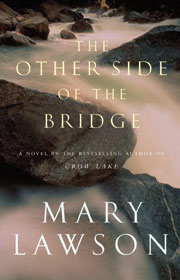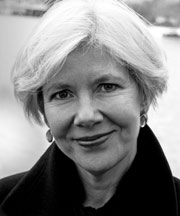Mary Lawson
Is there a downside to penning a critically acclaimed international bestseller? Mary Lawson would argue yes.
No one was more surprised than she was at the huge success of her first book, Crow Lake, released in 2002. Just published in its 22nd country (Poland), the novel propelled Lawson into unexpected literary stardom, with a guest appearance on the Today Show and gushing reviews in the New York Times, the Guardian and countless other publications.
“I really didn’t know what I had done right,” Lawson confesses. “I didn’t know if I could do it again.”

As her follow-up book, The Other Side of the Bridge, neared its publication date, Lawson worried about how it would be received. Would she be a one-hit wonder?
Then the new novel made the longlist of one of the world’s most prestigious literary awards, the Man Booker Prize. Lawson relaxed. “That didn’t necessarily mean that it would get good reviews,” Lawson explains. “It just meant that I would care less if it didn’t.”
As things turned out, the reviews for The Other Side of the Bridge have been glowing. “A beautiful read, on every level,” declared The Independent. “Lawson’s gifts are enormous,” added the Toronto Star. The book has been a fixture on the Maclean’s magazine list of Canadian bestsellers since its publication last fall.Two hit novels in a row. Not bad for a woman who was in her 50s when she finally published her first book. “I never had problems putting words on paper,” Lawson relates. “My only problem was figuring out what I wanted to say. I didn’t know that till I was nearly 50. Had I poured it on, full steam, in my 20s or 30s, I doubt I would have gotten there any sooner.”
She nearly didn’t get there at all. She spent years writing her first book. “It was no good. I shredded it. It had no heart to it.”
Crow Lake was the product of five more years of writing. This time Lawson was satisfied with what she had wrought. She sent it off to publishers.

Nathaniel Mobbs
For the next three years, Lawson collected rejection notices. Then an agent took an interest in the book and began to shop it around. Soon, there was a bidding war among seven publishers. Lawson was pleased, but perplexed.
“I could understand if I had reworked Crow Lake and made it a better book. But, no, it was the same exact book, word for word, that had been completely rejected before.” Her conclusion? “Luck plays an unacceptably large role in the whole business.”
Lawson has lived in Britain since 1968. She treated herself to the trip after graduating from McGill with a psychology degree and ended up staying. She married a British psychologist and raised two sons. But her novels are both set in northern Ontario. Lawson spent many of her childhood summers in the north, and the region’s majestic landscape and haunting stillness left a huge impression on her.
Things that you experience as a child “get into your bones at a more fundamental level than anything else,” Lawson explains. “It’s a cure for homesickness,” she says of her books’ setting. “I spend a lot of time there in my head.”
Lawson remembers her time at McGill fondly. The small-town girl was happily dazzled by the charms of Montreal. Largely as a result, she admits she wasn’t a star student.
“That wasn’t the fault of the teachers. We had both Donald Hebb and Ronald Melzack back then – really impressive figures and inspirational teachers. Even I noticed that.”
Before taking her first stab at a novel, Lawson dabbled in short stories. “The great thing about writing a novel, the part that’s the most fun, is developing a character over time,” says Lawson. “I could never do that to the same extent with short stories and I found that frustrating.”
She is delighted when her characters surprise her, as they frequently do. For instance, she had a very clear sense of the personalities of Kate and Matt, the central characters in Crow Lake, right from the start. Their brother Luke, though, was largely a mystery. He became a more pivotal figure than Lawson had originally envisioned, emerging from the shadow of his brilliant brother Matt. “He ended up as one of my favourite characters in the book. In many ways, he is the hero.” And sometimes characters originate from very familiar sources.
Crow Lake’s weepy Mrs. Stanovich, a somewhat ridiculous woman redeemed by her great warmth, is based, a little, on the author herself. “Her weepiness is my own. It’s absolutely absurd. I’m ready to burst into tears at anything.”


